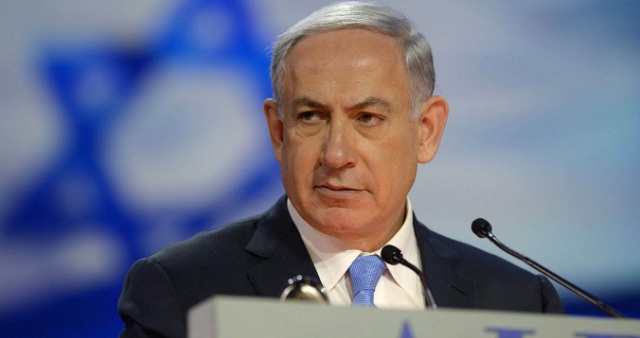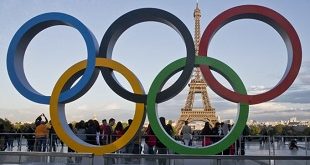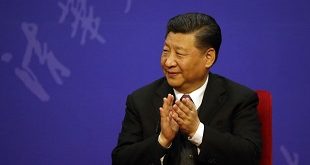
Washington, United States | AFP | Prime Minister Benjamin Netanyahu put aside his domestic legal woes on Tuesday to find a warm welcome in Washington at a meeting of the pro-Israeli lobby.
On the home front the veteran Israeli right-winger faces an intensifying corruption probe that could see the 68-year-old forced to stand down in ignominy after a total of 12 years in office.
But Netanyahu and his wife Sara, who has also faced police questioning over alleged bribery, were given a standing ovation at a meeting of the American Israel Public Affairs Committee, which styles itself “America’s pro-Israel Lobby.”
And this came a day after a visit with President Donald Trump to further cement an alliance that has helped Israel achieve its longstanding goal of winning US recognition of the divided city of Jerusalem as its capital.
The pair also bonded over shared antipathy to the 2015 Iran nuclear deal — hailed by Trump’s predecessor Barack Obama, five more world powers and Tehran as a diplomatic landmark, but now hanging by a thread.
Netanyahu thanked Trump for his vow to tear up the accord if it is not strengthened to prevent Tehran from resuming its alleged quest for atomic weapons, and said Israel and its Arab neighbors would back such a move.
To bolster his case he presented an ominous map with the countries of the Middle East that he accuses Iran of seeking to dominate — such as war-torn Syria and Yemen, Lebanon, Iraq and Gaza — colored in black.
“Darkness is descending on our region. Iran is building an aggressive empire,” he declared, accusing Tehran of exploiting its role supporting Bashar al-Assad in Syria’s civil war to set up permanent bases on Israel’s border.
– Breach the deal –
“The force behind so much of what is bad is this radical tyranny in Iran. I have a message for you today, it’s a very simple one: we must stop Iran, we will stop Iran,” he said.
Trump has withdrawn Washington’s endorsement of the deal, which America’s European allies regard as essential to restrain Tehran’s path to nuclear breakout capacity.
Iran insists it never intended to build a nuclear weapon, but has warned it could rapidly restore its enrichment capacity if the United States breaches the deal by restoring crippling economic sanctions.
Israel and Trump see the deal’s time limits as tantamount to providing Tehran with a path to the bomb, and argue that Iran has not moderated its behavior, but instead is playing an ever more dangerous game in its region.
Netanyahu’s longstanding concerns about the Iran nuclear deal have found a sympathetic ear in the White House and at AIPAC, but the left-leaning Washington lobby group J Street — which supports a two state solution to Israel’s conflict with the Palestinians — denounced him
“Prime Minister Netanyahu offered nothing new or substantive in his speech, only fear-mongering and empty rhetoric,” J Street president Jeremy Ben-Ami said.
“He lavished praise on the Trump administration’s incoherent and reckless threats to dismantle the Iran deal, which endangers Israel and American interests, and bring us closer to another war in the Middle East.”
Netanyahu stuck to familiar themes — the close US-Israel bond, his country’s high-tech expertise and the perfidy of Iran — and touched on briefly on the Palestinian issue.
He failed to endorse a two-state solution, and instead demanded that Palestinian leader Mahmud Abbas halt welfare payments to the families of dead or detained Palestinian militants, which he argues encourage the terrorist “murder of Jews.”
Trump’s White House has promised a new plan for Middle East peace, but has yet to unveil it and has appointed a US ambassador sympathetic to the cause of Jewish settlement of occupied land — and of moving the US embassy to Jerusalem.
This has taken the pressure off Netanyahu to compromise, and he has instead been trying to change the diplomatic conversation by reaching out to Israel’s former Arab foes and building economic partnerships with friends like India.
Netanyahu used his AIPAC speech to argue that Washington and Israel would not be alone when they choose to confront Iran, saying many Arab countries would side with the Jewish state over their common enemy.
“Most of the states in our region know, they know very well, believe me, that Israel is not their enemy but their indispensable ally in confronting our common challenges and seizing our common opportunities,” he said.
“That is true for Egypt and Jordan, Israel’s long time peace partners, but it is also true for many other Arab countries in the Middle East.”
 The Independent Uganda: You get the Truth we Pay the Price
The Independent Uganda: You get the Truth we Pay the Price


